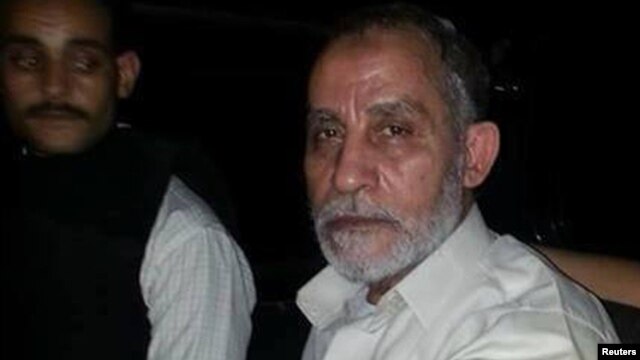Egypt detains Muslim Brotherhood leader for 'inciting murder'
| Publisher | Radio Free Europe/Radio Liberty |
| Publication Date | 20 August 2013 |
| Cite as | Radio Free Europe/Radio Liberty, Egypt detains Muslim Brotherhood leader for 'inciting murder', 20 August 2013, available at: https://www.refworld.org/docid/521f46a4b.html [accessed 19 May 2023] |
| Disclaimer | This is not a UNHCR publication. UNHCR is not responsible for, nor does it necessarily endorse, its content. Any views expressed are solely those of the author or publisher and do not necessarily reflect those of UNHCR, the United Nations or its Member States. |
Last updated (GMT/UTC): 20.08.2013 18:14
By RFE/RL
 Muslim Brotherhood leader Muhammad Badie sits in a police vehicle after being arrested by security forces in Cairo on August 20.
Muslim Brotherhood leader Muhammad Badie sits in a police vehicle after being arrested by security forces in Cairo on August 20.
Egyptian state television says Muhammad Badie, the top leader of the Muslim Brotherhood, is to be held for 15 days on allegations of having incited the murder of demonstrators.
The 70-year-old Badie was arrested by security forces early on August 20 in Cairo. He had been in hiding for over a month.
Egypt's military-installed authorities accuse him of inciting the killing of protesters outside the Muslim Brotherhood's Cairo headquarters before the ouster of President Muhammad Morsi.
The United States criticized Badie's arrest, with White House deputy spokesman Josh Earnest saying it was not in line with the military's commitment to an inclusive political process.
"This interim Egyptian government has made promises to transition back to a democratically elected civilian government," Earnest said. "The violence that they perpetrated last week and that has continued at least into the weekend and the early parts of this week is contrary to that promise."
Egypt's military ousted and detained Morsi, a senior Muslim Brotherhood leader, on July 3 following days of mass protests demanding his resignation. He is Egypt's first democratically elected president, after strongman Hosni Mubarak was ousted in a popular uprising in February 2011.
Badie's detention raises fears of new violence in Egypt, where nearly 900 people have been killed in recent days in clashes between security forces and Muslim Brotherhood supporters demanding Morsi's reinstatement.
'Rising Against The Coup'
Islamist supporters were defiant after Badie's arrest.
"We say to the army chief, Abdel Fattah al-Sisi: he believed that he could rob the nation, with the support of a part of the population, in fake protests, which lasted only several hours, so that they could act as a smokescreen to carry out a coup against the elected president," said Magdi Urur, a member of the Egyptian Islamic Labor Party.
"He will not enjoy power because people will rise against the coup in a civilized way, and that will amaze the world, just as the great revolution of January 25, [2011], did."
Security forces seized Badie during an early morning raid on an apartment near Cairo's Rabaa Al-Adawiya Mosque where security forces raided a protest camp of Brotherhood supporters on August 14, triggering days of clashes.
State media published photographs of Badie after his arrest and said he was being held in Cairo's Torah prison.
Hundreds of Muslim Brotherhood supporters, including many leaders, have been arrested since Morsi's ouster.
The Muslim Brotherhood said on August 20 that Mahmud Ezzat will take over from Badie as top leader. Ezzat is currently a deputy leader of the organization and is also subject to an arrest warrant.
Morsi himself has been held at a secret location since his ouster.
Meanwhile, state media said on August 20 that former Vice President Muhammad ElBaradei is to face trial on September 19 over his resignation.
The Nobel Peace Prize winner resigned in protest against the deadly crackdown on Morsi supporters. The reports said ElBaradei will be sued for a "betrayal of trust."
The case was brought by an Egyptian law professor, who argues that ElBaradei was appointed vice president as a representative of the liberal opposition and was obliged to refer his resignation to them.
Media reports said ElBaradei left Cairo for Vienna on August 18.
With reporting by AFP, dpa, AP, and Reuters
Link to original story on RFE/RL website
